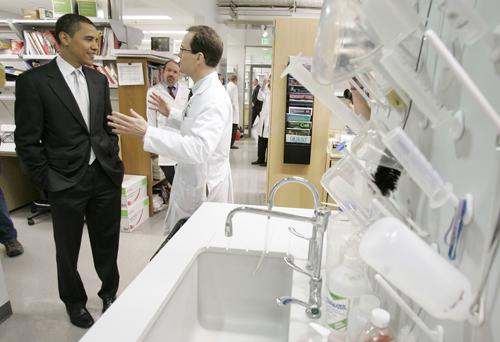Blagojevich battling lawmakers’ lack of enthusiasm for health care

Democratic presidential hopeful U.S. Sen. Barack Obama, D-Ill., talks with Dr. Mark Anderson while touring a cardiology research lab before speaking about his health care plan, Tuesday, May 29, 2007, at the University of Iowa in Iowa City, Iowa. Obama on The Associated Press
May 28, 2007
SPRINGFIELD, Ill. – An ambitious plan to guarantee health care for everyone in Illinois faces serious trouble because of differences between Gov. Rod Blagojevich and the General Assembly.
Blagojevich considers the plan his top priority – a must-have. But he has failed to convince lawmakers, even after a long meeting Monday with House Democrats. They remain more interested in providing money for other needs, such as schools, roads and pensions.
One after another, lawmakers say the governor’s goals are noble but not urgent, especially after other recent expansions of health care programs.
“If we had a lot of money, certainly we could do a lot of things for folks. But I think the majority of people in Illinois want to have something changed on the way we fund schools,” said Sen. Maggie Crotty, D-Oak Forest. “Once we put this to rest, we certainly can start looking at health care.”
The Democratic governor continues to say his health care plan must be a part of the final state budget.
Get The Daily Illini in your inbox!
“Our position is very clear: Health care for everybody,” he said Monday evening.
A growing number of residents in the state worry about health care, according to a series of surveys by Northern Illinois University’s Center for Governmental Studies. At the end of 2006, 17 percent ranked health care as their top concern, up from just 3 percent in 2003.
But that was a distant second to education, which was the top concern for 30 percent. The telephone survey of 1,242 people had a margin of error of plus or minus 3 percentage points.
Many lawmakers say Blagojevich’s proposal is too big and too costly.
It calls for spending at least $2 billion a year to guarantee health insurance for families earning up to four times the federal poverty level. Illinois would provide coverage directly for some people, subsidize insurance payments for others and require insurance companies to offer low-cost plans to some.
“To me, it’s like taking a large pizza and trying to eat it in one shot. It’s not going to happen,” said Sen. William Delgado, D-Chicago. “What is the hurry? We can do things incrementally and do it correctly.”
After meeting with House Democrats for more than 2« hours Monday, Blagojevich challenged them to come up with a spending plan of their own if they don’t like his. He refused to say whether he would consider a scaled-back health plan if House Democrats proposed one.
Several lawmakers emerged from the meeting saying they were more frustrated than ever. Blagojevich showed no willingness to compromise on the health plan, they said, even though the tax to pay for it has been shot down and the Legislature is supposed to adjourn Thursday.
“The lines in the sand are still drawn pretty thickly,” said Rep. Marlow Colvin, a Chicago Democrat and head of the House Black Caucus.
Spirits were higher in the Senate after Blagojevich met with black and Latino Democrats, who have pressed the governor to fund public schools with higher income taxes in exchange for lower property taxes. They appear willing to settle for a much smaller funding increase using money from gambling expansion and a variety of business taxes.
Blagojevich initially proposed two new taxes to pay for it – a $1 billion tax on businesses that spend little on employee health insurance and a $7.6 billion “gross receipts” tax that would also pay for education and property tax relief.
Amid widespread opposition to the gross receipts tax, Blagojevich now says he would be willing to use gambling money to pay for the program.
Health care advocates say lawmakers wouldn’t have to choose between helping schools and expanding health care if they would support both of the governor’s business taxes. But cries of outrage from business groups seem to carry more weight than the public’s demands for health care, they say.
“If there were a way to do it painlessly, everyone would be for it. The reality is, this takes courage,” said Howard Peters, a lobbyist for the Illinois Hospital Association.
Blagojevich’s past efforts to expand health care may be working against him now.
Several lawmakers said they see less urgency to act this spring because the state already offers health coverage to all Illinois children and has expanded care for their families.
Amid reports of problems with red tape, officials may want to wait and see how well the programs work before considering another expansion. Some other Blagojevich health care initiatives have not fared well, such as a program for veterans that has attracted only a few dozen users.
Some lawmakers say it might be feasible to adopt parts of Blagojevich’s plan. For instance, the state could provide more coverage to single people without children or help people with disabilities keep their coverage when returning to work.
But activists like Cherita Logan of Chicago’s Sankofa Community Organization said it’s easy for lawmakers to talk about taking small steps. They already have state-funded health care.
“This country has a disconnect between those who have and those who have not,” Logan said. “We thank God for the governor, that he has the tenacity to stand up.”






